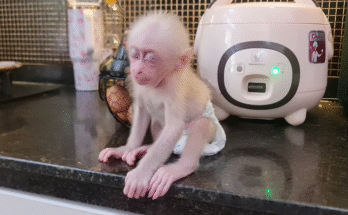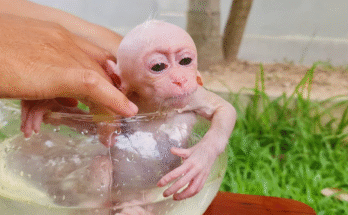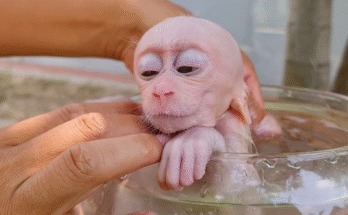A newborn monkey enters the world fragile and weak, clinging tightly to its mother for warmth, protection, and survival. In the wild, every moment is a test of endurance as the tiny infant struggles to hold on—both physically and emotionally. Its mother provides constant care, cradling her baby with unconditional love. The baby’s grip may be weak at first, but with time, nourishment, and a mother’s devotion, strength begins to grow. In nature’s delicate balance, this bond is a lifeline, ensuring survival against all odds. Witness the beauty of maternal care in these precious first days of life.
Newborn monkeys enter the world in a fragile state, completely dependent on their mothers for survival. Their first days are filled with challenges, but their instinct to cling tightly to their mothers helps them navigate the harsh realities of the wild. This article explores five key aspects of a baby monkey’s early life, highlighting their struggles, growth, and the unwavering maternal bond that ensures their survival.
1. The First Moments: A Life Dependent on Touch
A baby monkey’s survival instinct kicks in immediately after birth. Unable to walk or fend for itself, the newborn clings tightly to its mother’s fur, using its tiny but strong fingers to grip. This initial bond is crucial, as physical contact regulates body temperature, heart rate, and emotional security. In the wild, predators lurk, and separation can be fatal. The mother’s warmth provides not just comfort but also the vital nourishment of her milk, ensuring the baby’s first source of energy.
2. Maternal Instincts: A Mother’s Unbreakable Bond
A mother monkey is highly protective of her newborn. She constantly carries her baby, shielding it from potential dangers and keeping it close at all times. Grooming plays a significant role in this bond, as mothers meticulously clean their infants to remove parasites and establish trust. The baby responds by instinctively clutching onto its mother’s body, strengthening their connection. This nurturing process is not just about survival—it lays the foundation for the baby’s emotional well-being, teaching it social cues that will be essential later in life.
3. The Struggles of a Weak Newborn: Learning to Hold On
For the first few weeks, a baby monkey’s grip may not be strong enough, making every movement a challenge. Some newborns struggle to latch onto their mothers properly, requiring extra care. In cases of weakness or premature birth, the mother may need to pause frequently to let her baby rest and regain strength. However, not all infants survive these difficult early days. In the competitive world of nature, only the strongest and most determined endure, proving how critical a mother’s role is in ensuring her baby thrives.
4. Growth Milestones: From Weakness to Strength
As days turn into weeks, the baby monkey gradually gains muscle strength, improving its grip and mobility. It begins exploring its surroundings while still holding onto its mother for security. By the end of the first month, the baby may start attempting small jumps or grasping tree branches, though it always returns to the safety of its mother’s embrace. This stage is crucial, as it prepares the baby for future independence. With proper nourishment and maternal care, it will soon gain the confidence needed to climb, play, and interact with other young monkeys.
5. The Role of the Troop: Socialization and Protection
While the mother provides the primary care, the entire troop plays a role in raising the young. Other females, including sisters or grandmothers, often assist in grooming and protecting the newborn. In some species, dominant males also participate by keeping threats away. Socialization is essential for the baby’s development, teaching it communication skills, survival tactics, and hierarchical relationships within the troop. These early interactions shape its future and determine how well it will integrate into the group as it matures.
Conclusion
A baby monkey’s first days are a delicate balance between survival and growth. From the moment it is born, it must rely on its mother’s protection, warmth, and guidance. Despite the struggles of weakness and inexperience, the infant slowly adapts to its environment, growing stronger with each passing day. This journey of resilience and love showcases the incredible instincts that define primate behavior, making these first moments truly extraordinary.
A Dose of Care: Nurturing a Newborn Monkey
Caring for a newborn monkey is a delicate yet rewarding responsibility that requires patience, knowledge, and compassion. These tiny creatures, often born weak and fragile, rely entirely on their caregivers for survival and development. Providing proper care starts with understanding their nutritional, medical, and emotional needs.
One of the critical aspects of nurturing a newborn monkey is administering essential medications. Whether it’s vitamins, antibiotics, or vaccines, these treatments play a vital role in building their immunity and preventing illnesses. When medicating, it’s important to use sterilized tools and consult a veterinarian to ensure accurate dosages and safe practices. Gentle handling is crucial to avoid causing stress or injury to the baby monkey.
Beyond medication, newborn monkeys thrive on warmth, affection, and a sense of security. Mimicking their natural environment, such as using soft blankets or simulated maternal care, can help them feel safe and nurtured. Regular feeding schedules, proper hygiene, and consistent monitoring of their health further contribute to their well-being.
Ultimately, caring for a newborn monkey isn’t just about meeting their physical needs; it’s about creating a bond of trust and love. With the right approach, these tiny primates can grow into healthy, happy companions, making the effort truly worthwhile.
Caring for a newborn monkey is a profound responsibility that combines compassion, expertise, and attention to detail. These tiny primates, often born vulnerable and dependent, require specialized care to ensure their growth and survival. This comprehensive guide explores the essential steps to properly nurture a newborn monkey, emphasizing both medical and emotional support.
1. Understanding the Newborn Monkey’s Needs
Newborn monkeys, much like human infants, are fragile and require constant care. They depend entirely on their caregivers for:
- Nutrition: A newborn monkey’s diet typically starts with formula milk specially designed for primates. It is vital to avoid cow’s milk, as it can upset their delicate digestive systems.
- Warmth: These tiny creatures need a warm and cozy environment to mimic the comfort of their mother’s embrace. Heating pads and soft blankets can help maintain the appropriate temperature.
- Emotional Security: Monkeys are social animals. They thrive when they feel loved, safe, and secure, which helps reduce stress and promotes healthy development.
2. Administering Essential Medication
Proper medical care is critical to a newborn monkey’s survival. Medications such as vitamins, vaccines, and antibiotics may be necessary to protect them from diseases and build their immunity. Follow these key steps when administering medication:
- Consult a Veterinarian: Always seek professional advice before starting any treatment to ensure the medication and dosage are appropriate for the monkey’s age and weight.
- Use Sterile Tools: Ensure syringes, droppers, or feeding bottles are sterilized to prevent infections.
- Gentle Handling: Hold the monkey securely but gently to avoid stress or injury during medication.
3. Providing Proper Nutrition
Feeding is a cornerstone of newborn monkey care. The right nutrition supports their physical growth and cognitive development. Here’s how to manage their feeding schedule:
- Choose the Right Formula: Use a primate-specific formula that mimics the nutritional profile of natural monkey milk.
- Establish a Routine: Feed the baby every 2-3 hours, day and night, to meet their nutritional needs.
- Monitor Weight: Regularly weigh the monkey to ensure they are gaining weight as expected, a sign of good health.
4. Creating a Safe and Nurturing Environment
The environment plays a significant role in a newborn monkey’s well-being. Recreate a habitat that feels natural and secure:
- Temperature Control: Maintain a consistent, warm temperature using heating pads or lamps.
- Hygiene: Keep their bedding clean and dry to prevent infections.
- Stimulation: Introduce soft toys or other items to stimulate their curiosity and encourage natural behaviors.
5. Bonding and Socialization
Building a strong bond with the newborn monkey is essential for their emotional health. Gentle touches, soothing voices, and regular interaction help establish trust and reduce anxiety. Over time, introducing them to other monkeys or pets can aid in their socialization.
6. Monitoring Health and Development
Vigilant monitoring ensures that any health issues are addressed promptly. Watch for signs such as:
- Changes in appetite or weight
- Unusual lethargy or behavior
- Signs of illness such as coughing, diarrhea, or rashes If any concerns arise, consult a veterinarian immediately.
7. Challenges in Caring for Newborn Monkeys
Nurturing a newborn monkey is not without challenges. Common difficulties include:
- Health Complications: Premature monkeys or those separated from their mothers may face additional medical issues.
- Emotional Attachment: While bonding is crucial, overattachment can make eventual reintegration with other monkeys more difficult.
- Time Commitment: Caring for a newborn monkey requires round-the-clock attention and dedication.
8. Why Proper Care Matters
Providing exceptional care for a newborn monkey is not just about ensuring their survival. It’s about giving them a chance to thrive and lead a healthy, happy life. For those who care for monkeys professionally, whether in sanctuaries or research facilities, proper nurturing also sets the stage for



